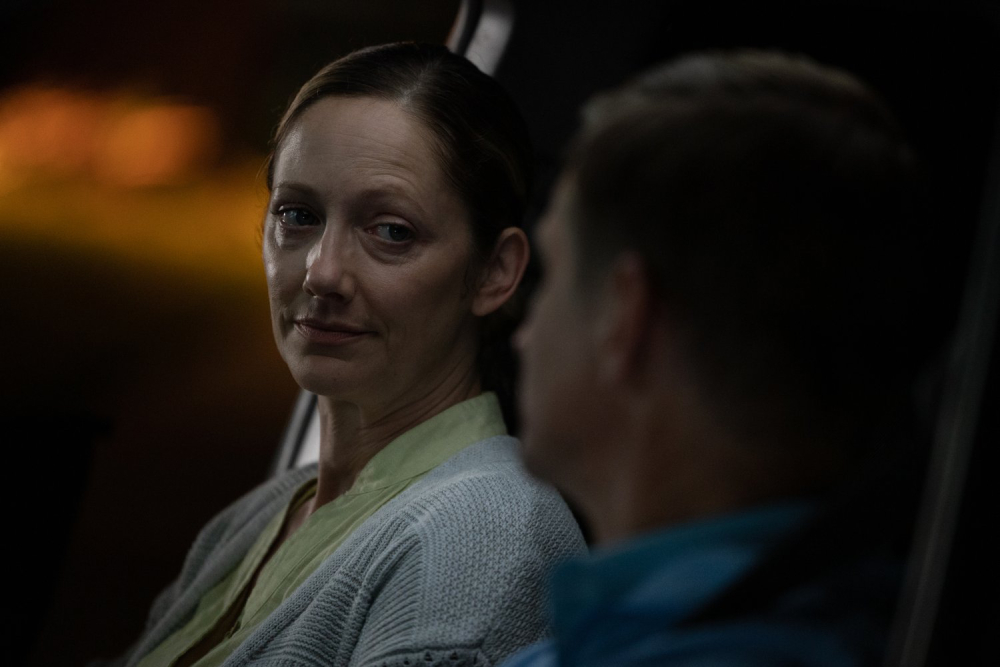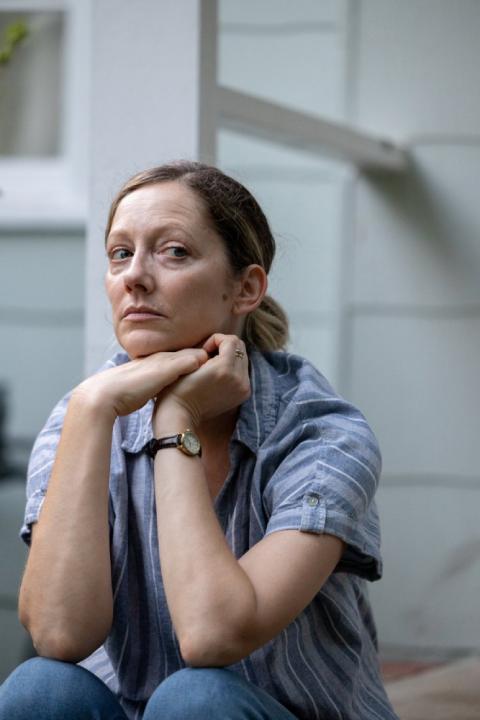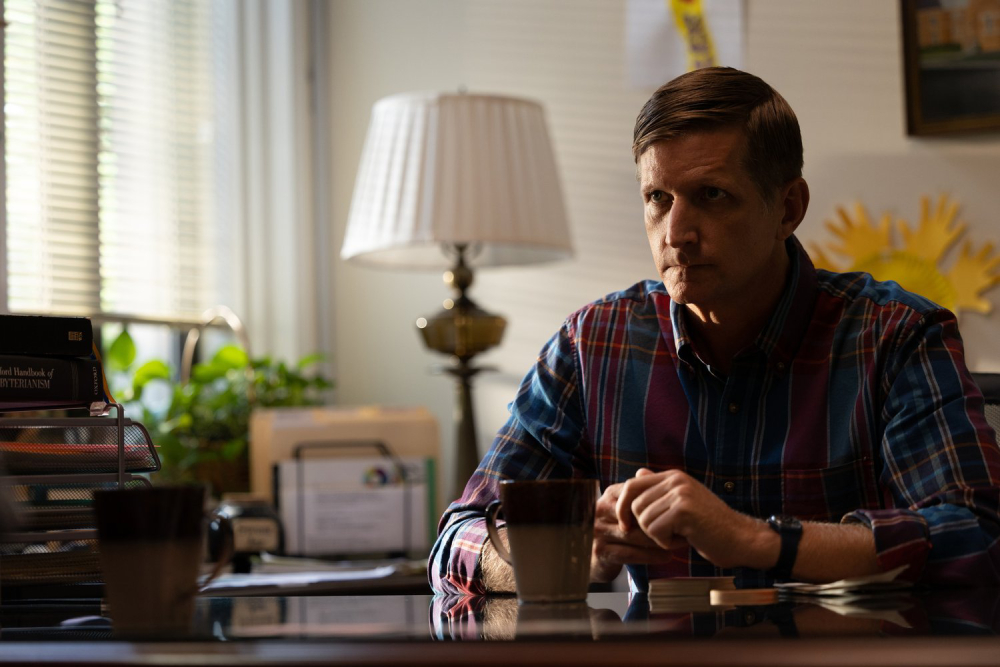
"Eric LaRue" follows the emotional journeys of parents of a school shooter who seek spiritual direction in two very different ways. (Magnolia Pictures)
Michael Shannon's directorial debut calls to mind the words of the apostle Paul in the book of Romans: "rejoice with those who rejoice; weep with those who weep." An adaptation of Brett Neveu's 2002 play of the same name, "Eric LaRue" follows the emotional journeys of parents Janice (Judy Greer) and Ron LaRue (Alexander Skarsgård) in the wake of a deadly school shooting committed by their own teenage son, Eric. To cope with their grief, denial and feelings of guilt, the two seek spiritual direction in different ways: Jancie meets with Presbyterian pastor Steve Calhan (Paul Sparks), while Ron becomes entranced by the triumphalism of motivational preacher Bill Verne (Tracy Letts).
Over Zoom and a phone call, director Michael Shannon and stars Judy Greer and Paul Sparks spoke with NCR about the film.
Two separate interviews have been combined, edited and condensed for clarity.
NCR: Paul, your portrayal of a pastor has such specificity, I have to ask: did you grow up in the church? If so, I'm curious how that background impacted your performance.
Sparks: I grew up Methodist in Oklahoma, and the churches were a huge part of the daily life of our small town. The church was always the social meeting place. My father passed away recently but my mother still lives in Oklahoma, and the church is still the place where everything happens. When I read Brett's script, I recognized the people that Brett had crafted. I recognized these hardworking people who were interested in the social health of their neighborhoods and communities.
Judy, your mother was a nun. I'm curious if you consciously drew on her history in this performance.
Greer: Yes, my mom was a nun for four years. Her Mother Superior felt she would be more suited to serve God in a more secular environment. She left and we remained Catholic for a few years then moved to the Presbyterian church when I was ten. But similar to Paul, the church was always a pretty major part of my childhood. My parents still go to church and are devout. I went in a different direction, but think that "search" is something I took with me when playing Janice.
Michael, I'd love to hear more about the use of lighting and the colors in the film. You bathe everything in this sort of supernatural, almost stained glass windows-type light, but it feels cold, almost as if Janice's inner grief has colored her outside environment.
Shannon: I had one of the best production designers out there, Chad Keith, working on this and of course, Andrew Wheeler, my Director of Photography. Andrew deployed a lot of filters when shooting to give that dry feel to the film, especially for the blues in Janice and Ron's house. I also want to give credit to my costume designer, Alexis Forte. Alexis, Andrew and Chad were working at a high frequency to coordinate the look and ambiance which could be a blind spot for me as a first-time director.

Director Michael Shannon and actor Judy Greer on the set of "Eric LaRue." (Magnolia Pictures)
Color is a very spiritual thing and I love how cold the house feels, because it's a manifestation of what's happened to Janice and Ron. They've lost their son and, by extent, have lost the beating heart of their household. Even though their son is alive, life has been extinguished. I also love the color palette in the store where Janice works, specifically those green vet smocks that they all wear. The light in Steve's office is also phenomenal. It was a challenge to film in there because there's only one window, but Andrew did a phenomenal job of making that room feel slightly different each time we were in it, to add to that sense of disorientation.
Judy, back to the note of color, I love the way Janice's outfits shift throughout as a way to mirror her character growth.
Greer: I only start to figure out who someone is after my first costume fitting or my first conversation with a costume designer. Alexis and I were trying to build a wardrobe for Janice, not just costumes for each scene.

Judy Greer as Janice LaRue. Greer's mother was a Catholic nun before discerning out to marry and have children. (Magnolia Pictures)
We started with what I'd wear in the last scene and worked our way backward. There was this outfit that I loved that I wore in the first meeting with the mothers scene, where one of the mothers didn't show up. I wore this silk blouse with a belt and it was a look we modeled after a specific person who'd been in this situation. In my mind, Jancie dresses up well for that because it serves as a way for her to prepare for this difficult conversation. When the mother doesn't show up and we see Janice slide back into what she used to wear, it's almost as if she's responding to the rejection of that mother.
When Janice finally meets with Eric, my hair in that scene is down and more wild which represents this catharsis of release. I also read that as her wanting to impress her son in the meeting; hoping that she will make him feel better somehow by her looks.
The deployment of humor was interesting in a film like this, where the subject matter is so heavy. I'm thinking specifically of your delivery of the "Taco Tuesday" line, Paul.
Sparks: I suspect that for Steve, so much of his life is about trying to entertain. As a pastor, he tries to be entertaining and his delivering that line in that way is him trying to do something for Janice's amusement. He entertains to break the ice and make people feel capable of relaxing and dealing with some of the big issues that they may have, as a pastor does. When he doesn't know what to do next, he defaults to what he knows: "I'm going to entertain you. I'm going to make you laugh and feel good." There's an expectation for pastors that they bring power and something interesting to look at. We could debate whether or not that's important, but I do think that that is something that a lot of pastors think through.
Advertisement
Another theme of the film is the way the busyness of our present lifestyles gets in the way of healing. We're expected to move on quickly when healing is rarely straightforward.
Greer: I think that the sitting Shiva is one of the most beautiful rituals of healing. I don't personally practice, but that's something that's built into the Jewish religion that lets you grieve. I don't feel like we do that in a secular way or in other religions… maybe Lent? We don't seem to prioritize a time of grief in the way that space is set up.
The scenes where we see Ron trying to participate in corporate praise at Redeemer reminded me about the role of live music to bring about healing. Where do you see the role of music in the ways we process trauma?
Shannon: Music is one of the most beautiful things that people do. Music makes me think "Oh, thank God we're here so then we can make music." I also equally value silence. We live in a noisy world and there's lots of noise that doesn't have any direction, function or necessary purpose. Ron is pursuing a musical outlet but Janice is pursuing a more contemplative path.
The release that Ron gets from the ecstasy of being in that church music space has offered a lot of comfort over the years. I would never say that it's not valid. With this particular story, it's about something that we're not understanding about society, beyond guns. What is it about our society that people continue to find themselves in a situation where they feel like the only recourse they have is to hurt other people? Why does that keep happening? It's very confusing.

Actor Paul Sparks, who grew up Methodist in Oklahoma, told NCR he immediately recognized the important role of the church in small town life when he read the script. (Magnolia Pictures)
Sparks: The most intelligent and studied person would have difficulty with processing a school shooting; no one is equipped to deal with this stuff. Our kids are not supposed to die in that way. This is something that's not supposed to happen. We're not wired to be able to deal with this. And the fact that we do it in a messy way is nobody's fault.
It's easy to read Eric LaRue as an indictment of the insensitive ways Christians offer support and aid in a time of mourning, but the phrase that kept coming to mind of me was "well-meaning but ill-equipped." I think that could describe a lot of clergy when they try to shepherd their congregation through tragedy.
Sparks: In that scene where he tries to hold the meeting for Janice and the other moms, you get the impression that Steve is at the beginning of therapy. He's learned a lot of words, theories and ideas but he's probably not implemented a lot of them and is just winging it. But I love how earnest he is. He can see the damage and the trauma that's been done but he just doesn't have the tools to help people. I appreciate that the movie struggles with how to deal with that type of trauma that, no matter what we do or say or who or how we worship, always sticks with us.
To me, "Eric LaRue" is not a comment on churches being inept or somehow screwing things up. Rather, churches are the places where people go to have these conversations in these small towns; the church is like the town square.
"Eric LaRue" opened in theaters on April 4 and became available digitally on April 11.




